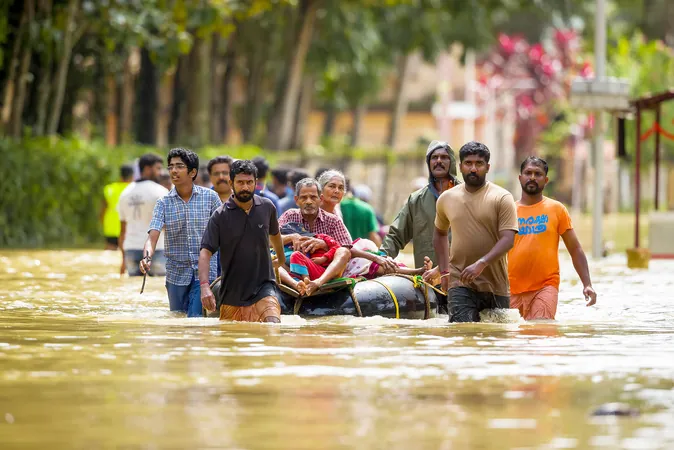
Floods: A Hidden Health Crisis Waiting to Erupt
2025-04-10
Author: Rajesh
Major Health Risks Uncovered Post-Floods
Recent revelations are igniting conversations among health experts worldwide. A groundbreaking multi-country project reveals that flooding isn't just about structural destruction—it's a looming threat to human health, potentially sending more individuals to hospitals for surprising health issues.
A Monumental Study
Led by Professors Yuming Guo and Shanshan Li from Monash University, this extensive study analyzed over 300 million hospitalization records from eight flood-prone regions, making it one of the largest investigations of its kind.
A Shocking Surge in Health Issues
The findings are staggering—hospitalization for illnesses surged by 26% following major flood events, with these adverse effects lingering for up to seven months. Floods wreak havoc not just on property but also on people's health.
Floods: The Silent Culprit
Beyond the physical destruction, floods contaminate local water supplies, leading to unexpected illnesses. Contaminated water increases the risk of gastrointestinal diseases, spreading harmful pathogens through communities that already lack access to clean sources.
Breeding Grounds for Disease
Stagnant water from floods creates ideal conditions for mosquitoes and other disease vectors, exacerbating outbreaks of infectious diseases like dengue and malaria.
Health Complications on the Rise
The repercussions extend to chronic health issues as well. Post-flood, cancer and diabetes rates surged, with the incidence of diabetes skyrocketing by 61% and mental health diagnoses rising by 11%. Damage to roads can also hinder access to essential medical appointments for critical treatments.
Sanitation Crisis After Catastrophe
The aftermath of flooding often leads to overcrowded and unsanitary living conditions, which can worsen respiratory issues and increase infection risks. Makeshift housing can complicate access to vital medications, especially for those with chronic conditions.
Mental Health Takes a Hit
In the wake of floods, mental health suffers significantly. The grief from property loss and displacement can disturb sleep patterns and weaken immune systems, paving the way for various health dilemmas.
Identifying Vulnerable Populations
Older adults, already facing mobility challenges, and children are among those at heightened risk. The study showed that densely populated areas amplify these health impacts, allowing diseases to spread more easily.
Climate Change Intensifies Flood Risks
Prof. Guo warns that climate change is set to worsen flood conditions, with more frequent heavy rainfall and rising sea levels. Vulnerable communities with inadequate infrastructure will undoubtedly face extended recovery periods after disasters.
Proactive Measures to Alleviate Health Crises
Healthcare providers are urged to identify high-risk patients preemptively. Establishing mobile clinics and stockpiling essential medications can mitigate health complications during evacuations.
The Burden of Socioeconomic Status
Socioeconomic factors come into play particularly in underserved areas, where resources for evacuation and shelter are limited. This can lead to delays in health care, leaving underlying illnesses unaddressed.
Strengthening Community Resilience
Transformative measures—improving disaster response systems, reinforcing infrastructure, and maintaining vital transportation routes—are key to helping communities weather floods with fewer health complications.
Collaboration is Key
Local governments must collaborate with public health authorities and community organizations to prepare for floods. Updating risk maps and implementing early warning systems can keep residents and health workers well-prepared for incoming storms.
A Call to Action for All
Addressing the health crises following floods requires collective effort. All stakeholders—from public health agencies to community volunteers—must work together to avert dire outcomes and support the most vulnerable populations.
Published in Nature Water
This crucial study highlights an often-overlooked aspect of flood impact on society. It emphasizes the urgent need for comprehensive disaster preparedness and resilience-building to safeguard public health in the face of climate-induced challenges.



 Brasil (PT)
Brasil (PT)
 Canada (EN)
Canada (EN)
 Chile (ES)
Chile (ES)
 Česko (CS)
Česko (CS)
 대한민국 (KO)
대한민국 (KO)
 España (ES)
España (ES)
 France (FR)
France (FR)
 Hong Kong (EN)
Hong Kong (EN)
 Italia (IT)
Italia (IT)
 日本 (JA)
日本 (JA)
 Magyarország (HU)
Magyarország (HU)
 Norge (NO)
Norge (NO)
 Polska (PL)
Polska (PL)
 Schweiz (DE)
Schweiz (DE)
 Singapore (EN)
Singapore (EN)
 Sverige (SV)
Sverige (SV)
 Suomi (FI)
Suomi (FI)
 Türkiye (TR)
Türkiye (TR)
 الإمارات العربية المتحدة (AR)
الإمارات العربية المتحدة (AR)